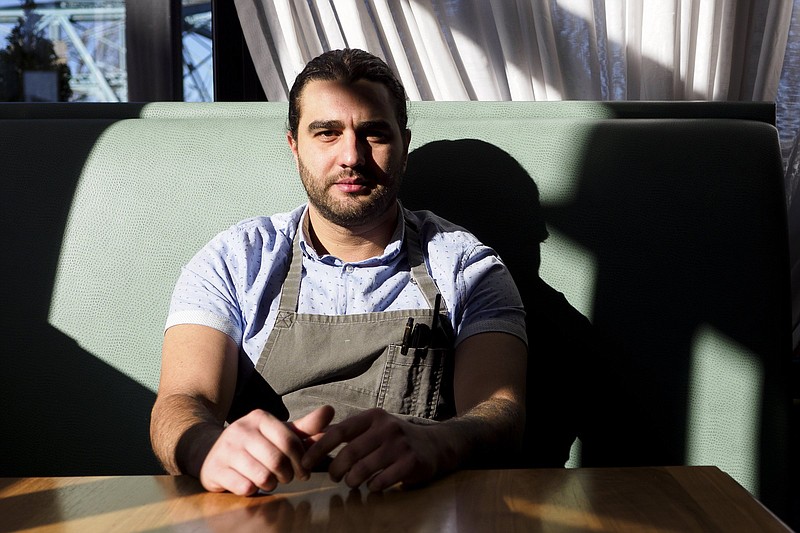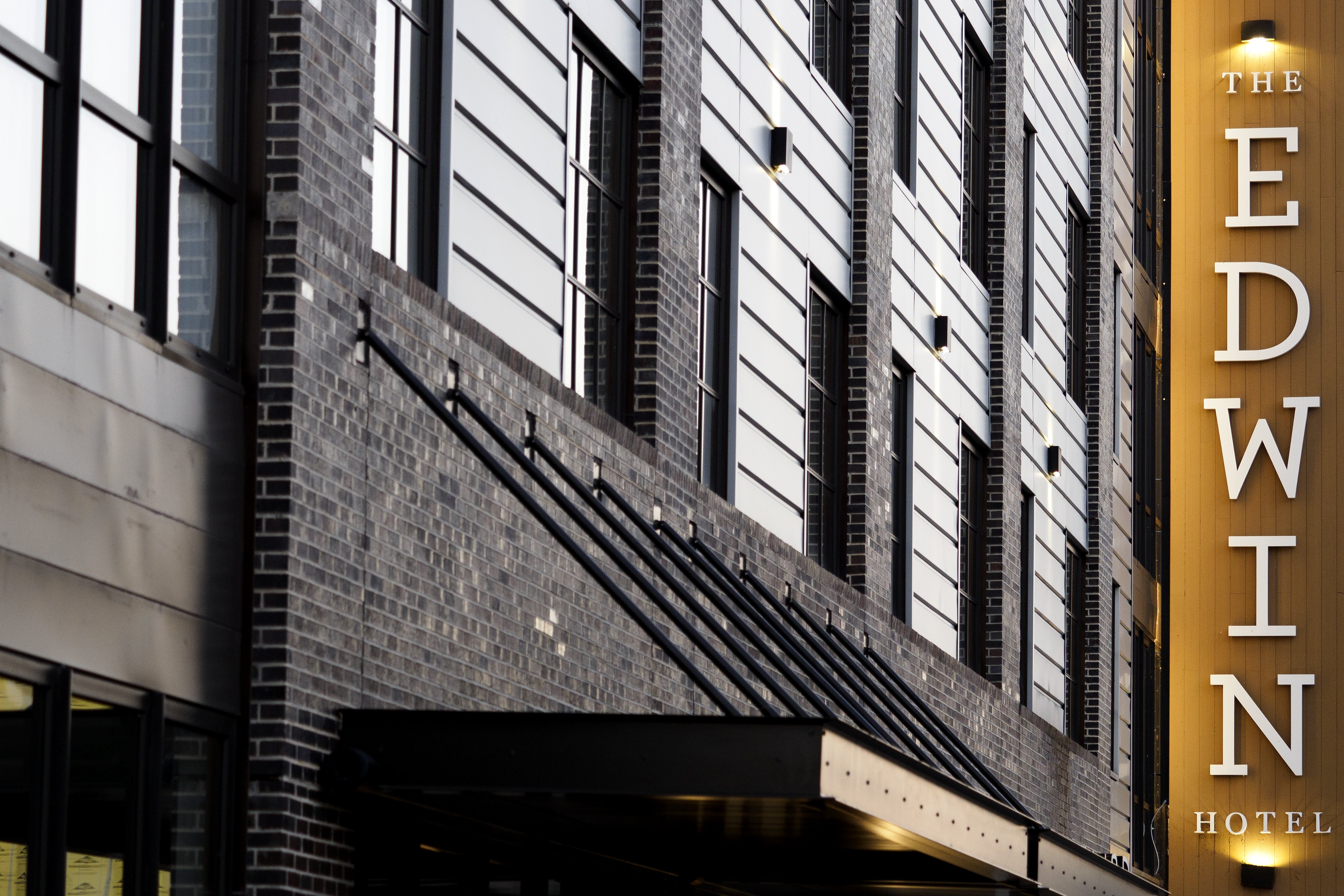When Khaled AlBanna, the new executive chef at The Edwin hotel, arrived in Chattanooga in 2012, he was anticipating a career as a civil engineer. If the change of plans sounds surprising, there had been hints along the way. AlBanna's roundabout journey from Amman, Jordan, had focused heavily on food.
AlBanna was born in Egypt, grew up in Amman and made his way to the United States in 2009. He worked in restaurants around the United States before heading to Alabama to attend college. In 2011, he visited a friend in Chattanooga and fell in love with the Scenic City.
"I liked the downtown vibe, and the city had more to offer than where I was," he says. "I stopped by UTC and took a tour. It only took me a day to decide to move here."
He moved here in 2012 and enrolled at the University of Tennessee at Chattanooga. His major was civil engineering, but he couldn't deny his love for cooking. During college, he hired on at Lookout Mountain Club and applied lessons learned from working in restaurants around the U.S., in cities including Chicago, New York and Washington, D.C.
"The Lookout Mountain Club gave me the freedom to put to work all I had learned through my work back home and through my travels," AlBanna said. "Every season I took a couple of weeks off to travel to a specific restaurant to 'stage.' Staging is an unpaid internship when a cook works briefly in another chef's kitchen to learn and be exposed to new techniques and cuisines."
At The Edwin, AlBanna is in charge all aspects of hotel dining, which includes the Whitebird restaurant, the Whiskey Thief rooftop bar, in-house catering and in-room dining.
Q: So you didn't go to culinary school?
A: No, I did not. Most of my knowledge has been influenced by the environment I grew up in.
Q: Do you come from a family of cooks?
A: Yes, there are seven of us in the family who cook professionally. My younger brother runs a smokehouse in Jordan and, before that, he was a sous chef at a historic hotel in Ireland. My aunt is retired, but she operated a little restaurant in Amman, then she became a nutritionist. One cousin works at a restaurant in London, England, and another works for a restaurant in Cairo, Egypt. And my mother owned and operated a restaurant in Jordan and another in Egypt.
Q: Who was the major influence in your decision to become a chef?
A: It wasn't a person. I enjoyed being in a kitchen - cooking, learning, creating, building connections and relationships. It's my happy place. I tried to work in my field of study, but something kept pulling me back to this industry.
Q: What's your earliest food memory?
A: When I was a child, my whole family would gather every Sunday at my grandparents' house, and my grandmother would cook for everyone. I still remember it like it was yesterday. Most of my flavor influence came from my mother and grandmother.
Q: What was your first job in a restaurant?
A: It was in Amman when I was 13. I washed dishes and processed vegetables as needed. I worked a couple of days a week. It wasn't for the money. It gave me something to do. I always liked to have a project.
Q: What's the most-important cooking tool in your kitchen at The Edwin?
A: I wouldn't know where to start. We make everything from scratch at Whitebird - our breads, some dairy products and most of our meats are fabricated in-house. So what's the most-important? There isn't just one thing - the oven, stove, knife, mixers, smokers, dehydrators, immersion circulator The list goes on. I believe they are all equally important.
Q: How has the pandemic changed things for you?
A: We had to adapt to different margins across the board, and it was challenging at first. This year is my first as an executive chef. I had to learn and readjust quickly, while maintaining a steady growth and a vision for both. We downsized our food offerings and became committed to only sourcing locally, which supports other local business. That tells a great story because it limited us to work with what we had at the moment. I believe that increased our creativity, freshness and quality.
Q: How does cooking for a hotel restaurant differ from a traditional standalone restaurant?
A: Not really that much - they're just a few more pieces in play, like in-room dining, longer operating hours, bigger catering events. My duties start with hiring and training; budgeting and purchasing; creating menus and service touches; payroll; managing the staff; promoting; and marketing - with the help of the marketing department; and preparing food, among other things.
Q: So it doesn't sound like you have much time to yourself, but when you do, what do you like to do?
A: Rest first, then reconnect with friends and family. I like trying out different restaurants and bars, being outdoors. I love hiking and swimming, but haven't had the chance lately.
Q: Complete this sentence. If I hadn't become a chef, I would have
A: I guess I would've finished my degree and become an engineer somewhere.
Q: What food is your guilty pleasure?
A: Cold cold chocolate chip cookies and chocolate fudge brownies. My favorite. Everyone who knows me knows that about me. Chocolate is my favorite.
Q: What's your favorite thing on the menu and why?
A: Currently, I have a connection with the lamb shank dish because of childhood memories. It reminds me of flavors from family dinners my mother made.
Braised Lamb Shanks
Chef Khaled AlBanna says this is a good recipe for a midwinter meal served with your favorite rice.
6 lamb shanks, trimmed of excess fat
1 tablespoon oil
2 large carrots, cut into slices 1/2-inch thick
1 large white onion, diced
6 cloves garlic, minced
1 teaspoon coarse salt
1/2 teaspoon freshly ground pepper
1/4 cup flour
2 cups beef stock or water
1 1/2 cups red wine (I recommend a good-quality dry red that's not too expensive)
3 tablespoons chopped parsley
2 teaspoons chopped rosemary
Wash and pat dry lamb shanks with paper towel. On a stovetop, heat 1 tablespoon of oil in a heavy-based pot. Sear 2 shanks in the hot oil until browned on all sides. Repeat with remaining shanks, and set them aside. In the same pan, sauté the carrots and diced onions until softened, about 3 minutes, then add garlic and cook for 1 minute.
Return the shanks to the pot; season with salt and pepper. Sprinkle with flour, toss well and cook for 4-5 minutes to brown. Add stock, wine and herbs. Cover, and bring to a boil, then reduce heat to low and simmer for 1 1/2 to 2 hours, stirring occasionally, until the meat is falling apart.
Email Anne Braly at abraly@timesfreepress.com.

